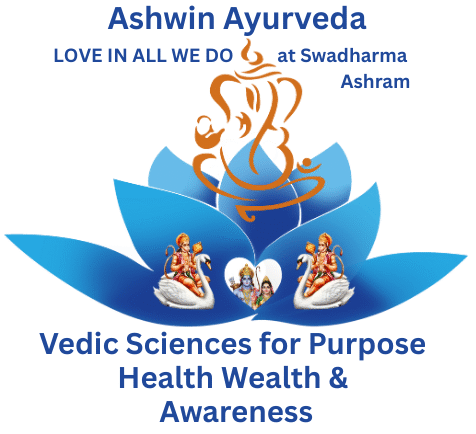Ayurvedic Psychology (“Vedic” Psychology and/or Spiritual or Holistic Psychology) is the science of understanding the human experience and integration of body, mind/ego, and You (or Self) and that enables a person to live life in joy and peace in all they do. Ayurvedic Psychology will awaken or enlighten a person to his/her truth and provide practical methods to successfully and purposefully live life. The Ayurvedic Psychologist will help a person understand their:
1) Purpose in life (Dharma), spiritually and practically, with belief & faith in all they do
2) Gifts, talents & skills, career, and excel in life’s goals & objectives (Artha)
3) Unfulfilled desires and attachments (Kama); and why those exists and how to fulfill them
4) Awaken spiritually and practically to live life in joy & peace (Moksha) and inspire others
Ayurvedic Psychology (Spiritual or Holistic Psychology) is rooted in the Veda and/or Vedic Sciences, which includes sciences such as Ayurveda (Science of Life) and Yoga among others branches. Vedic Sciences are based on universal laws and principles, and are not a religion, but a science, philosophy & lifestyle enabling an understanding of the entire creation physical and subtle. Vedic Sciences are the most comprehensive and successful sciences found to date and describe the human experience, body, mind, ego and higher Self, in detail. Vedic Sciences cover all subjects that a person may need to live life in joy & peace. By contrast, western psychology is defined as “the science of mind and behavior” and it is limited in terms of the integration of the entire human experience – body, mind, and You (or Self).
If you are ready to be a compassionate listener, healer, moderator, facilitator, and life coach to people in need than Ayurvedic Psychology is for you.
The following is a sample curriculum of what you will learn and practice in our Gurukulam style method of learning:
Year 1 – 850 – 1,000 hours
Introduction to Vedic Sciences
Samskritam (Sanskrit) basics
Overview of Ayurvedic (“Vedic”) Psychology and its understanding of the mind
Foundations of physio-anatomy
Vedic Psychology and western psychology
Yoga and its 8 step approach to self-realization and self-healing body and mind – Level 1
Introduction to Ayurveda, Science of Life, Self-Healing and How to Live
Nutrition for body, mind and You – Level 1
Vedic Psychology Life Coaching – Light on Life – Level 1
Introduction to Jyotisha (Vedic Astronomy/Astrology)
Year 2 – 850 – 1,000 hours
Yoga and its 8 step approach to self-realization and self-healing body and mind – Level 2
Ayurveda, Science of Life, Self-Healing and How to Live – Understanding and Healing the body, mind, and Self connection
Nutrition for body, mind and You – Level 2
Subtle bodies and energy (Prana) channels
Marma Chikitsa/Accupressure, theory and practicum for healing body and mind
Foundations of Vedic Astrology (Jyotish) with a focus on relationships and body/mind health
Pranacharya – Pranic (Energy) healing for body/mind and inner awareness
Jyotisha (Vedic Astronomy/Astrology) – Level 1
Vedic Psychology Counseling – Techniques and methods for healing body/mind – Level 2
Relationship and relationship counseling – Level 1
Vedic Psychology Life Coaching – Light on Life – Level 2
Classical textbooks of Āyurveda – Level 1
Dravyaguna Shastra, Herbology for Healing Body and Mind – Introduction
Case Management and Pathophysiology for Mind Disorders – Intermediate
Year 3 thru Year 4 – 850 – 1,000 hours per year
Dravyaguna Shastra, Herbology – Intermediate and Advance
Classical textbooks of Āyurveda – Level 2
Jyotisha (Vedic Astronomy/Astrology) – Level 2
Introduction to Shodana Chikitsa, Panchakarma & body therapies for healing body/mind
Relationship and relationship counseling – Level 2 and 3
Case Management and Pathophysiology for Mind Disorders – Advance
Shamana Chikitsa, Palliative and Outpatient Consultations
Nadi Vijnanam, pulse diagnosis
Yoga and its 8 step approach to self-realization and self-healing body and mind – Level 3
Student clinic practicum and Gurukula (client consultations)
Internship and practicum – 850 – 1,000 hours

